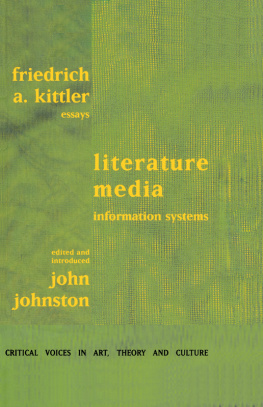Contents
Guide
Pages
Theory Now
Series Editor: Ryan Bishop
Virilio Now, John Armitage
Baudrillard Now, Ryan Bishop
Nancy Now, Verena Conley
Rancire Now, Oliver Davis
Sloterdijk Now, Stuart Elden
Foucault Now, James Faubion
iek Now, Jamil Khader and Molly Anne Rothenberg
Kittler Now, Stephen Sale and Laura Salisbury
Kittler Now
Current Perspectives in Kittler Studies
Edited by
Stephen Sale and Laura Salisbury
polity
Copyright this collection, Editors Introduction, Chapters 24 and 611 Polity Press 2015
Copyright Chapter 1 Friedrich A. Kittler 1984
Copyright Chapter 5 Friedrich A. Kittler 2011
Copyright Chapter 1, this English translation Polity Press 2015
First published in 2015 by Polity Press
Polity Press
65 Bridge Street
Cambridge CB2 1UR, UK
Polity Press
350 Main Street
Malden, MA 02148, USA
All rights reserved. Except for the quotation of short passages for the purpose of criticism and review, no part of this publication may be reproduced, stored in a retrieval system, or transmitted, in any form or by any means, electronic, mechanical, photocopying, recording or otherwise, without the prior permission of the publisher.
ISBN-13: 978-0-7456-6397-5
A catalogue record for this book is available from the British Library.
The publisher has used its best endeavours to ensure that the URLs for external websites referred to in this book are correct and active at the time of going to press. However, the publisher has no responsibility for the websites and can make no guarantee that a site will remain live or that the content is or will remain appropriate.
Every effort has been made to trace all copyright holders, but if any have been inadvertently overlooked the publisher will be pleased to include any necessary credits in any subsequent reprint or edition.
For further information on Polity, visit our website: www.politybooks.com
Acknowledgements
This volume was conceived following the conference Media Matters: Friedrich Kittler and Technoculture held at Tate Modern, London, in 2008. That event was supported both financially and intellectually by Birkbeck, University of London, and the London Consortium, and the editors are profoundly grateful to all those who helped to bring some of the most radical aspects of German Medienwissenschaft to London. We would also like to thank the contributors to this volume for their belief in the project, their good humour and their patience. The support and dedication of the editors of Polity Press have similarly been invaluable.
We are grateful for permission to reproduce the lyrics from Pink Floyds Brain Damage to Warner Chappell Music Ltd (Brain Damage Words and Music by Roger Waters Roger Waters Music Overseas Ltd (NS). All rights administered by Warner Chappell Music. Australia Pty Ltd.) and to Hampshire House Publishing Corp. (Brain Damage. Words and Music by Roger Waters. TROCopyright 1973 (Renewed). Hampshire House Publishing Corp., New York, New York. International Copyright Secured. Made in U.S.A. All Rights Reserved Including Public Performance for Profit. Used by permission. Deathless Aphrodite of the spangled mind, Here to me from Krete to this holy temple from If Not, Winter: Fragments of Sappho, by Anne Carson, copyright 2002 by Anne Carson, are used by permission of Alfred A. Knopf, a division of Random House, Inc., and Little, Brown Book Group Limited. An extract from Oh England My Lionheart is reproduced by permission of EMI Music Publishing. A version of the chapter If the Cinema Is an Ontology, the Computer Is an Ethic by Alexander R. Galloway was first published in his book The Interface Effect (Cambridge: Polity, 2012).
The editors would like to thank Paul Feigelfeld, in particular, for his assistance in bringing the volume to completion. Not only did he undertake meticulous translations for the volume, he also liaised carefully and sensitively with the late Friedrich Kittler, who was committed to the dissemination of his ideas and to the success of this volume to the last. Without Friedrich Kittlers generosity and dedication to his intellectual project beyond any reasonable expectations, Kittler Now simply would not have happened. We would also like to extend our thanks to Susanne Holl, Kittlers widow, whose cooperation with this project has been sincerely appreciated.
Finally, we would like to thank Roger Luckhurst for his intellectual and practical guidance, and Fiona Robertson for her unstinting support throughout the gestation of the project.
Contributors
Caroline Bassett is Professor of Media and Communications and Director of the Centre for Material Digital Culture at the University of Sussex. She is author of The Arc and the Machine (Manchester University Press, 2007). She has recently been writing on expertise and digital media, and on silence as a response to digital media in First Monday. She is currently completing a monograph on anti-computing for Manchester University Press.
Katherine Biers is an Associate Professor in the Department of English and Comparative Literature at Columbia University. She is the author of Virtual Modernism: Writing and Technology in the Progressive Era (University of Minnesota Press, 2013). Her articles and reviews have appeared in Representations, Textual Practice and several edited collections.
Steven Connor is Grace 2 Professor of English in the University of Cambridge and fellow of Peterhouse, Cambridge. He has published books on Dickens, Beckett, Joyce and postmodernism, as well as on topics such as ventriloquism, skin, flies, air and sport. His most recent books are Beyond Words: Sobbing, Humming and Other Vocalizations (Reaktion, 2014) and Beckett, Modernism andthe Material Imagination (Cambridge University Press, 2014). His website at www.stevenconnor.com includes lectures, broadcasts, unpublished work and work in progress.
Paul Feigelfeld worked for Friedrich Kittler from 2004 to 2011 and is the editor of Kittlers source code and software for the upcoming Collected Works. Feigelfeld worked as a teacher and researcher at Humboldt Universitys Institute for Media Theories from 2010 to 2013, and since 2013 has coordinated the Digital Cultures Research Lab at Leuphana University Lneburg.
Alexander R. Galloway is a writer and computer programmer working on issues in philosophy, technology and theories of mediation. Professor of Media, Culture, and Communication at New York University, he is the author of several books on digital media and critical theory, most recently The Interface Effect (Polity, 2012).
Mark B. N. Hansen is Professor of Literature and Arts of the Moving Image at Duke University. His books include Embodying Technesis: Technology Beyond Writing (University of Michigan Press, 2000), New Philosophy for New Media (MIT Press, 2004), Bodies in Code: Interfaces with New Media (Routledge, 2006) and the forthcoming Feed-Forward (University of Chicago Press).
Friedrich A. Kittler (19432011) was a literary scholar and media historian. In the course of a long and distinguished career, Kittler pioneered a new technologically inflected approach to the humanities. He was Professor of Aesthetics and History of Media at the Humboldt University, Berlin, and held visiting professorships at Columbia University, Yale, Stanford, Berkeley and other institutions. His works include Discourse Networks 1800/1900 (Stanford University Press, 1990), Gramophone, Film, Typewriter






